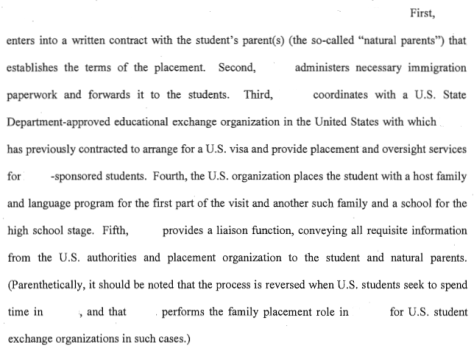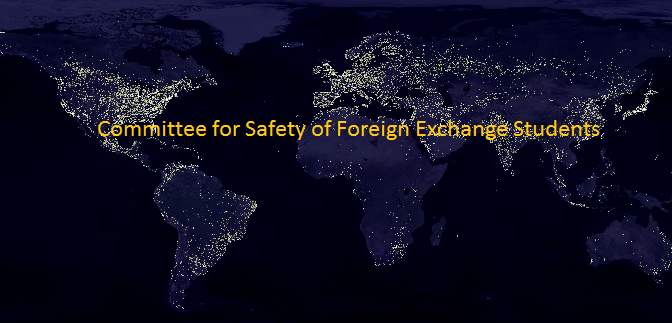Once an exchange student has decided that they think they would fit the exchange student life, they need to decide whether to travel through an exchange organization. Some countries, like Japan, give you no choice. You must travel with an exchange organization in order to get a visa to their country. I do not know what other countries have this as their guideline.
To know if you want to travel with an exchange organization, it is probably a good thing to figure out what an exchange organization is and how the exchange process is supposed to work (in an ideal world). I will try to cover both and more in this mail. Aside from previous knowledge High School Exchange has been my source of information.
What is an exchange organization
Basically, an exchange organization is a company that promises to take care of you and your needs while you are traveling as an exchange student to another country. They are supposed to stand in place of your parents are expected to exercise the kind of care that the parents themselves would exercise if they could. The needs they cover are:
- Safe and clean housing. The definition of a safe and clean house may vary from country to country. However, your host home should NOT be in a criminal neighborhood. When it comes to clean it should be somewhere between OCD clean and a layer of dirt on surfaces.
- Safe host family. I will cover this in a separate post.
- Schooling at an approved (by authorities) institution.
- Transportation to and from school.
- Documentation (see below).
What types of exchange organizations are there?
Volunteer organizations: These exchange organizations base most of their work on volunteers. Usually, there is a small staff with average salaries that take care of essential bureaucracy. All other staff voluntarily work to help the student exchange experience be a good one. There are three organizations that I know of that function this way: Rotary, AFS and YFU/YFU-USA (not sure exactly how YFU-USA fits in with the rest of YFU) .
Non-profit organizations: Everyone from representative to owners get reimbursed in some manner. In the US, host-families are not paid. This is not true of most of the other countries. I’m not sure how to tell a true non-profit from one that knows how to play the tax games. This list shows how some companies might earn more than it would appear.
- Aspect Foundation (Aspect Education Group/Kaplan/Graham Holdings)
- EF Education (Signum International and Universal Care)
- EF have their own insurance company creating a potential conflict of interest situation: Erika Travel Insurance
- Explorius/Educatius/CETUSA (CET Management)
- Forte International Exchange Association/Astar Education (Forte Group)
- Into Education/Into GMbH (Either Into GMbH or SMG)
For-profit organizations. These exchange organizations are in the business of making money. I do not know if their representatives get paid more than the non-profit ones (price per student placed). Nor do I have any idea what the quality of their product is. In the US, these firms fall into the F-1 student exchange programs. That means that the student is somewhat less protected by the regulations that protect the J-1 exchange student. Elsewhere, child protection laws are the same for all types of exchange organizations.
Communication between the various parties
In a student exchange situation there are several parties involved. You have the parents of the exchange student, the exchange student, the exchange organization in the home country, main office in host-country, host-country local representative, host-country school, host-family.
When you sign a contract with your exchange organization at home, you usually authorize them to function as a go-between for you and the partner organization. Most contracts forbid contact between parents and partner organization. In addition, the exchange companies do not want you to have contact with your child’s school. Nor do they encourage contact with the host-family.
Your child is supposed to communicate with their local representative who then brings the matter up the chain and eventually to the parents. The host-family is supposed to use the same route.
The experience of CSFES has been that the intended message is not always the end message. We encourage contact between parents and the student, parents and the host parents and in crisis between parents and the school. We also encourage you to keep all contact documented (emails, sms, reports of phone calls etc.). Just in case.
Home country exchange organization
Most exchange organizations will use the following procedure:
- After the potential exchange student has filled out application 1 (YFU’s is used as an example), the exchange organizations chooses the students they think will fit with their program.
- Where this is an option, the organization together with the student and her/his family decide if the student is to travel on a regular student exchange, on a more exclusive one or travel to a boarding school.
- Application part 2 (once again YFU’s) if filled in by parent and student and signed. From a certain date, the parent has now handed over guardianship of the exchange student to the exchange company.
- Collect all necessary documentation in connection with visa and schooling and forwards this to partner.
- Hold information meeting.
- Be a point of contact between biological parents and partner.

Partner organization
- Provides trained leaders and representatives.
- Matches representative and exchange student.
- Matches exchange student and host family.
- Makes sure ALL necessary documentation has been forwarded to the proper authorities in connection with host family, representative and school. (Every year this is an issue)
- Makes travel arrangements to and from host country.
- Some hold orientations camps.
- Responsible for all host-country trips.
- Is supposed to «be there» for the student 24/7.
- Assists the host family and exchange student with questions regarding visa and insurance.
- Supportive of school leadership.
- During emergencies they are to ensure the student has necessary assistance.
- Students who break the laws of the host country are returned.

